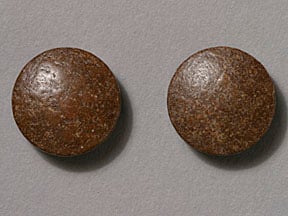
Ferrous Fumarate Coupons & Savings Card – Discount Prices from $8.91
Generic for: Ferretts, Ferrimin 150, Ferrocite
My prescription
Edit
324 (106 Fe)MG, Ferrous Fumarate (30 Tablets)
Select pharmacy

Walgreens
$8.91
COUPON PRICE
Albertsons
$9.40
COUPON PRICEFerrous Fumarate savings card
Show this card to your pharmacist
Walgreens
$8.91
BIN
ID
PCN
GRP
011867
LHFB390E99
HT
LABH001
Powered by
Price history for Ferrocite (brand) & Ferrous Fumarate (generic)
30 Tablets, 324 (106 Fe)MG
Average retail price for Ferrocite
Average retail price for Ferrous Fumarate
Average SaveHealth price for Ferrous Fumarate
Our price history data is based on aggregated prescription data collected from participating pharmacies in America. Our prescription data updates daily to reflect the latest price changes. If you notice a missing data point, it means there wasn't sufficient data available to generate a monetary value for that date.
We analyzed Ferrous Fumarate prices for (324 (106 Fe)MG, 30 Tablets) over the last 12 months. The average retail price was $34.67, while the average price using the SaveHealth discount card was $7.90. That's a savings of approximately 77.21% when using our Ferrous Fumarate coupon.
Compared to the generic version, Ferrocite had an average price of $11.29 over the same time period. With the SaveHealth savings card, Ferrous Fumarate is 30.03% cheaper on average than Ferrocite.
*Retail prices are based on pharmacy claims data, and may not be accurate when we don't have enough claims.
Ferrous Fumarate dosage forms
Dosage Quantity Price from Per unit 29MG 100 Tablets $6.01 $0.06 324 (106 Fe)MG 30 Tablets $9.40 $0.31 324MG 90 Tablets $13.19 $0.15 324MG 100 Tablets $13.83 $0.14 324 (106 Fe)MG 100 Tablets $13.83 $0.14
| Dosage | Quantity | Price from | Per unit |
|---|---|---|---|
| 29MG | 100 Tablets | $6.01 | $0.06 |
| 324 (106 Fe)MG | 30 Tablets | $9.40 | $0.31 |
| 324MG | 90 Tablets | $13.19 | $0.15 |
| 324MG | 100 Tablets | $13.83 | $0.14 |
| 324 (106 Fe)MG | 100 Tablets | $13.83 | $0.14 |
